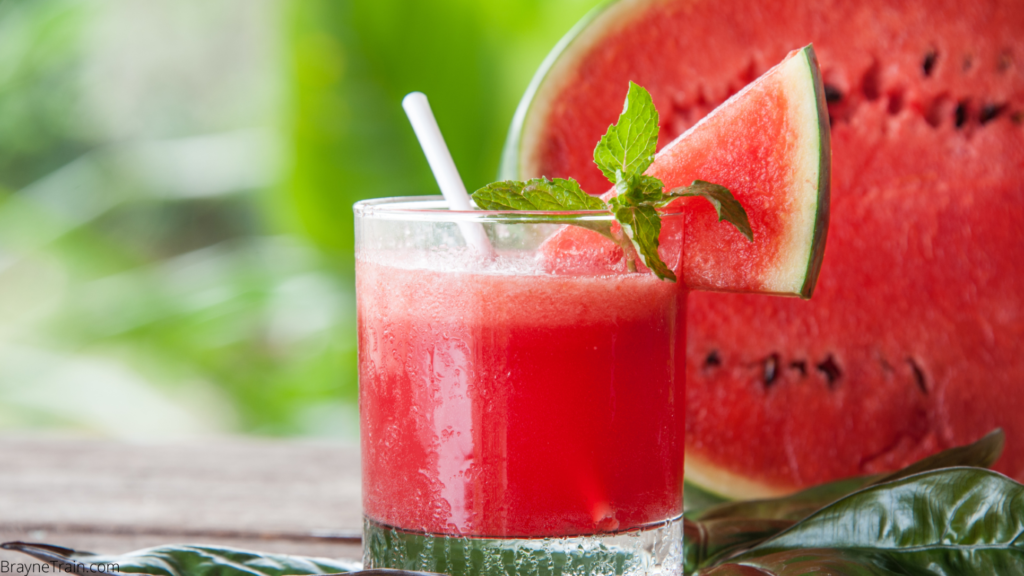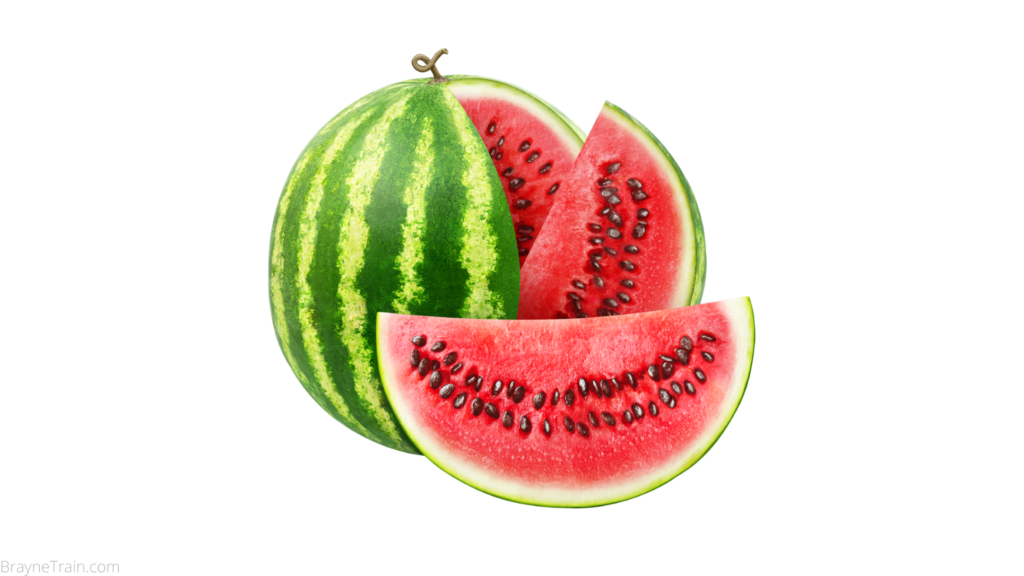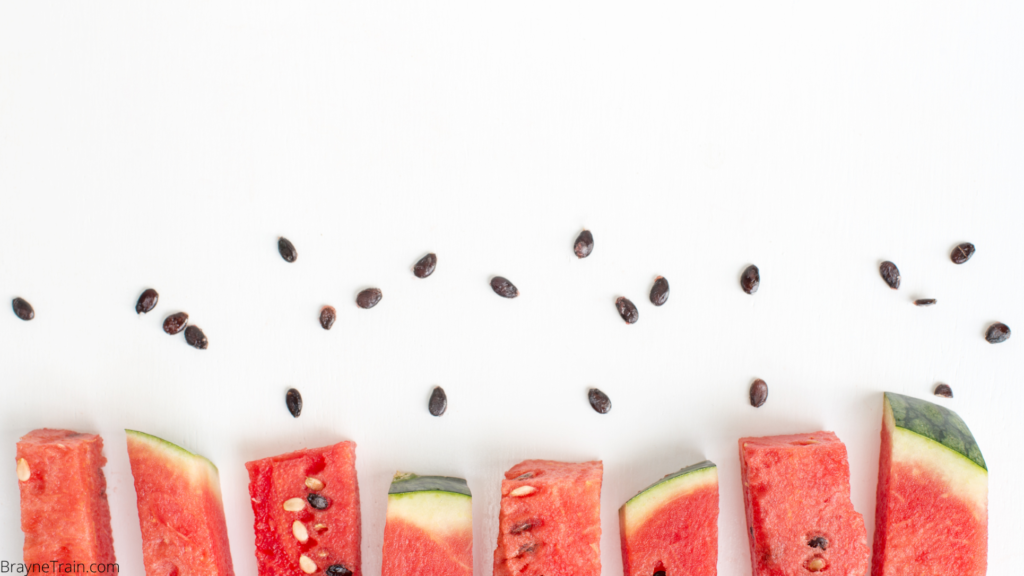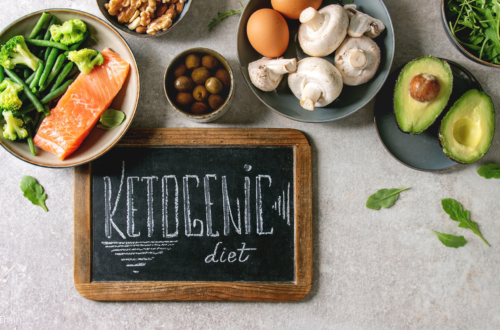
Does Watermelon Make You Gain Weight?
Watermelon originated nearly 5000 years ago in Africa. The citron melon, which grows in southern Africa, is believed to be the ancestor of this fruit.
However, there is evidence of the Egyptians growing watermelon crops well before southern Africa’s farming began.
Watermelon is one of the most popular summer fruits. Not only is it delicious, but it’s also packed with nutrients and antioxidants. In fact, this fruit is so tasty that some worry it could be too good to be true!
A question commonly asked about watermelon is whether or not it could cause weight gain.
According to science, eating watermelon in moderation does not result in weight gain, because one cup of watermelon has only 46 calories, and also, watermelon has a low glycemic load which means it has a low carbohydrate content.
In this post, we will discuss the benefits of watermelon and explain in detail why eating this fruit may be healthy for you.
So keep on reading to learn more!

Can Watermelon Cause Weight Gain?
Watermelon has a high glycemic Index of 72 but a low glycemic load of 4.
The glycemic Index is the speed at which sugar is elevated after consuming food, and the glycemic load is the number of carbohydrates in that food.
Due to its low carb content and low-calorie nature, eating watermelon in moderation does not result in weight gain.
However, if you eat large portions of watermelon, the glycemic load multiplies quickly and may result in weight gain.
To learn when is the best time to weigh yourself, click here.
Can You Eat Watermelon On The Ketogenic Diet?
Generally, eating small portions of watermelon on the ketogenic diet is acceptable.
However, overeating this tasty fruit may kick you out of ketosis.
Therefore, if you decide to eat watermelon while on keto, eat mindfully and keep track of your macros throughout the day.
To learn more about losing weight with the ketogenic diet, click here.
Top 7 Benefits of Watermelon

May Reduce the Risk of Cancer
Studies have indicated that eating watermelon may help reduce the risk of cancer, particularly breast, lung, and prostate cancer.
Two compounds found in watermelon may be the reason for its anticancer effect, lycopene and cucurbitacin E.
Lycopene is a nutrient in watermelon that gives this fruit its red color. It cleans the body from damaged cells and is believed to work by lowering the number of insulin-like growth factors (IGF) in the blood.
IGF is a hormone that promotes cell division. Notably, cancer forms when cell division becomes uncontrollable.
Cucurbitacin E is thought to help stop tumor growth by promoting the autophagy of cancer cells.
Autophagy is the process of the body removing damaged, old cells.
Keeps The Body Hydrated
Staying hydrated is vital for the body to function properly.
In addition to drinking plenty of water, eating food with high water content can help keep you hydrated throughout the day.
Watermelon has a 92% water content, making it an excellent source for hydration, especially during hot summer days.
May Reduce Risk of Heart Disease
Studies indicate that lycopene may help lower cholesterol and blood pressure, contributing to a healthy heart.
In addition, watermelon contains citrulline, an amino acid that may increase nitric oxide levels in the body.
Nitric oxide’s function in the body is to help blood vessels expand, resulting in lower blood pressure.

Recover Faster from a workout
Studies have shown that athletes who consumed watermelon juice after a workout recovered faster.
Watermelon is a rich source of citrulline, an amino acid that may improve exercise performance.
Also, citrulline helps maintain the blood flow while working out.
To learn when the best time is for working out during a fast, click here.
Nutrient Rich
Watermelon is a rich source of vitamins and minerals, including vitamin C, A, B6, potassium, and magnesium.
Watermelon is also a great source of antioxidants which help prevent oxidative damage caused by free radicals in the body.
In addition, vitamin C helps repair damaged tissue and build healthy bones, cartilage, and teeth.
1 cup of raw, diced watermelon contains:
- Calories: 46
- Carbs: 11.48 grams
- Sugar: 9.42 grams
- Protein: 0.9 grams
- Fiber: 0.6 grams
- Fat: 0.2 grams
- Vitamin A: 5% of the Daily Value (DV)
- Potassium: 170 mg or 4% of the DV
- Vitamin C: 12 mg or 21% of the DV
- Magnesium: 15 mg or 4% of the DV
May Improve Eyesight
Some studies suggest that eating watermelon helps prevent age-related eye problems.
Lycopene’s anti-inflammatory and antioxidant effect can help prevent macular degeneration. This age-related eye problem can cause blindness in the elderly.
More human studies need to be done to confirm this claim.
Increases Immunity
Watermelon is a rich source of antioxidants, vitamin C, and lycopene which may help reduce inflammation and oxidative damage caused by free radicals.
Chronic inflammation is a root cause of many diseases.
Studies indicate eating watermelon may help reduce chronic inflammation. However, more human studies are necessary to confirm this claim.
To learn about the anti-inflammation diet, click here.

Adverse Side Effects Of Watermelon
Overeating watermelon may lead to digestive problems, bloating, or pain in individuals with a sensitive stomach or IBS.
The high water content of watermelon may result in diarrhea.
Therefore, if you suffer from a sensitive stomach, make sure to eat watermelon in moderation and mindfully.

Takeaway
Watermelon can be considered a superfood with its rich content of antioxidants, vitamins, and minerals. Also, it is unlikely to gain weight from eating watermelon as long as you eat it in moderation. However, overeating watermelon could lead to weight gain, bloating, and stomach discomfort, so next time you try to enjoy this tasty fruit, stay mindful and don’t overdo it. Thank you for reading!
References:
Allerton TD, Proctor DN, Stephens JM, Dugas TR, Spielmann G, Irving BA. l-Citrulline Supplementation: Impact on Cardiometabolic Health. Nutrients. 2018 Jul 19;10(7):921. doi: 10.3390/nu10070921. PMID: 30029482; PMCID: PMC6073798.
Manivannan A, Lee ES, Han K, Lee HE, Kim DS. Versatile Nutraceutical Potentials of Watermelon-A Modest Fruit Loaded with Pharmaceutically Valuable Phytochemicals. Molecules. 2020 Nov 11;25(22):5258. doi: 10.3390/molecules25225258. PMID: 33187365; PMCID: PMC7698065.
Imen, Tlili & Hdider, Chafik & Lenucci, Marcello & Ilahy, Riadh & Jebari, Hager & Dalessandro, Giuseppe. (2011). Bioactive compounds and antioxidant activities during fruit ripening of watermelon cultivars. Journal of Food Composition and Analysis. 24. 923-928. 10.1016/j.jfca.2011.03.016. https://doi.org/10.1016/j.jfca.2010.06.005




